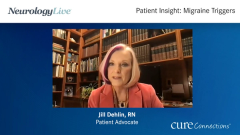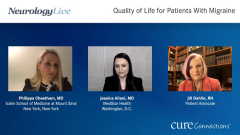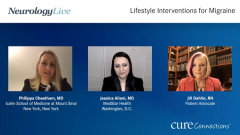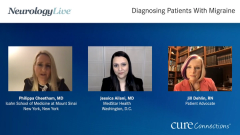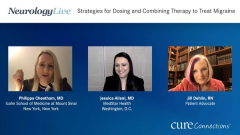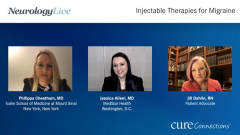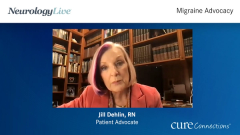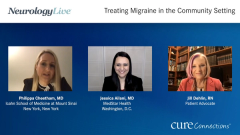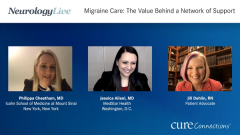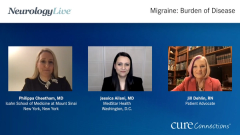
Migraine Advocacy
Jill Dehlin, RN, describes her role as an advocate in supporting others with migraine and connecting them to the support and resources needed to best manage their condition.
Episodes in this series

Philippa Cheetham, MD: Jill, I want to move on and talk about the phenomenal value that you bring to the table in migraine advocacy. As a doctor in medicine and as a sufferer of migraines, I thought I knew a lot, but we never stop learning in medicine. Even people like Dr Ailani, who are at the forefront of the field and dealing with this all day, every day, who are keeping very up to date with all these new medicines, are still learning.
Can you talk a little about your work in patient advocacy and how you communicate your wealth of knowledge and expertise personally and professionally? How do you get the word out to people watching segments like this, wanting to get the right information—the relevant information, the up-to-date, not just Dr Google, information? How do you maximize getting the word out to the right people at the right time?
Jill Dehlin, RN: I think Dr Ailani would agree with me in that you have to start with where people are. Some people have educated themselves somewhat about their disease. That is great because you can start giving them information at a little higher level. But there are others who are just figuring out that they do not have a sinus headache, and that their physician has not been treating them for migraine. They have been getting some other treatment for something that they do not have.
I also direct people to different kinds of organizations and websites that have reputable information. There are a lot of blogs out there that have great information and some that do not have such great information; a discerning consumer needs to be able to take a look at what these blogs are saying and figure out if that is reliable or not. One thing they can do is see if the statement that is given on the website is cited in some way and then look up that article. You can compare what that person is saying on their blog to what the article is really saying. Not a lot of people are going to do that, so they trust the information they are given on blogs. There are some blogs that have much better information than others, and you have to be so careful about that.
Philippa Cheetham, MD: What do you consider the main role of an advocate? What do you do best, do you think? Do you think it is helping people connect with the right clinicians? Is it providing empathy for people who may feel very alone and isolated in this? Is it helping them consider new treatment options? How do you rate what you offer? How do you determine your most valuable roles when being an advocate?
Jill Dehlin, RN: One of the things I do is help people understand their disease. I will educate them about what is happening, but as Dr Ailani does, I will listen to their story because I do not want to be sending them down some rabbit hole that is not applicable to them. I try to tell people that they can demand more from their treatment. So often people try to muddle through with over-the-counter medications and are in complete migraine denial. Then they set themselves up for a rebound headache or even run the risk of going from being an episodic to chronic migraine sufferer. You have to discern what kind of information they need.
I do not often tell people about headache specialists that they can see because insurance plans are so different and the geographic limitations are so severe. I will help people figure out ways to get past all the insurance denials. These insurance companies will often put up these huge barriers because they do not want to pay for these expensive, new medications. They want to go through the whole algorithm and include β-blockers, triptans, and topiramate to make sure those cheaper versions do not work, but sometimes you are just wasting time if you are having bad adverse effects from those drugs, and you start to feel like a guinea pig if nothing is working.
Philippa Cheetham, MD: Well, for patients, when they are working with a neurologist—a neurologist is a specialist, but we all know that even within a subspecialty, there are special interests. One neurologist may have a very strong interest in migraine; another may have an interest in seizure disorders or multiple sclerosis. Dr Ailani, you must see many patients who have seen other neurologists who may not necessarily have interest and expertise in migraine. As a patient, you may not know what your doctor’s subspecialty or interest is. Migraines are so common, but even migraine specialists can only see so many patients per day. How do we guide patients who are listening to this segment to see the right specialist?
Jessica Ailani, MD: I think, in the end, it is not about finding the right specialist, but the right person. The right person is the one who is willing to work with you and with whom you feel comfortable building a relationship. I think the worst thing—there are 2 things you can do that are the worst. I think Jill mentioned the first, which is to accept that nothing is going to change. I think that is the worst thing I see: someone will be willing to accept nothing happening for a long time because they think that is the best there is. I see it often.
The second thing is giving up too quickly when someone is really trying to help you, or when you go from person to person and you do not build that relationship with a clinician, especially when living with a disease like migraine. It can take time and effort, and it sometimes is a process of trying, combining, and shifting treatment plans. There is creativity—add a little of this, add a little of that. I think this world is very fast-moving and fast-paced. Patients often want to hear everything at once, but you cannot process all of that at once, so we have to give it in pieces. I think patients should try to build a relationship but understand when it is not going to be a buildable relationship. That relationship can be with your primary care physician. It can be with a general neurologist. It can be with your gynecologist. It just has to be with a person you trust, who is willing to work with you.
Philippa Cheetham, MD: Thank you for watching NeurologyLive® Cure Connections®. If you enjoyed the program, please subscribe to our e-newsletter to receive upcoming programs and other great content right in your inbox. Thank you so much.
Transcript Edited for Clarity
Newsletter
Keep your finger on the pulse of neurology—subscribe to NeurologyLive for expert interviews, new data, and breakthrough treatment updates.


